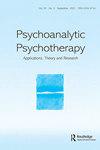儿童发展有风险时的亲子精神分析心理治疗:过程评估
IF 1.2
Q1 PSYCHOLOGY, PSYCHOANALYSIS
引用次数: 0
摘要
本研究的目的是了解当儿童发展处于危险时,亲子精神分析心理治疗的心理治疗过程,重点是治疗干预。这项研究的参与者是一名刚开始接受心理治疗的4个月大的婴儿,根据儿童发展风险指标(IRDI)的评估,她的发育处于危险之中,她的父母和一名心理治疗师也参与了这项研究。在9个月的时间里进行了30次亲子心理治疗,以音频和视频的形式记录下来,随后由两名独立法官详细描述,以进行分类和干预分析。对收集到的数据进行频率分析和定性分析。结果表明,在整个治疗过程中使用的治疗干预措施的类型和数量发生了变化。发生最多的干预措施是那些针对父母-婴儿精神分析心理治疗的干预措施,当儿童发展处于危险之中时,被称为韵律。众所周知,仍有许多有待探索的地方,需要进一步的研究来了解当儿童发育处于危险中时,父母-婴儿精神分析心理治疗的其他干预措施是如何表征的,考虑到这个案例可能有其特殊性,考虑到家庭历史以及心理治疗师的背景和个人特征。本文章由计算机程序翻译,如有差异,请以英文原文为准。
Parent-infant psychoanalytic psychotherapy when child development is at risk: process assessment
The aim of this study is understanding the psychotherapeutic process in parent-infant psychoanalytic psychotherapy when child development is at risk, focusing on therapeutic interventions. Participants in the research were a 4-month-old baby at the beginning of psychotherapy, whose development was at risk – assessed from the Risk Indicators for Child Development (IRDI) - her parents and a psychotherapist. Thirty parent-infant psychotherapy sessions were carried out over nine months, being recorded in audio and video and subsequently described in detail for classification and intervention analysis by two independent judges. Frequency analysis and qualitative analysis of the collected data were performed. The results showed that there was a change in the types and number of therapeutic interventions used throughout the treatment. The interventions which occurred the most were those specific to parent-infant psychoanalytic psychotherapy when child development is at risk, referred to as prosody. It is known that there is still much to be explored, and further studies would be needed to understand how other interventions in parent-infant psychoanalytic psychotherapy when child development is at risk are characterized, considering that this case may have its specificities, taking into account the history of the family and also the background and personal characteristics of the psychotherapist.
求助全文
通过发布文献求助,成功后即可免费获取论文全文。
去求助
来源期刊

Psychoanalytic Psychotherapy
PSYCHOLOGY, PSYCHOANALYSIS-
CiteScore
1.30
自引率
37.50%
发文量
22
期刊介绍:
Psychoanalytic Psychotherapy publishes original contributions on the application, development and evaluation of psychoanalytic ideas and therapeutic interventions in the public health sector and other related applied settings. The Journal aims to promote theoretical and applied developments that are underpinned by a psychoanalytic understanding of the mind. Its aims are consonant with those of the Association for Psychoanalytic Psychotherapy in the NHS (APP in the NHS) in promoting applied psychoanalytic work and thinking in the health care system, across the whole age range.
 求助内容:
求助内容: 应助结果提醒方式:
应助结果提醒方式:


